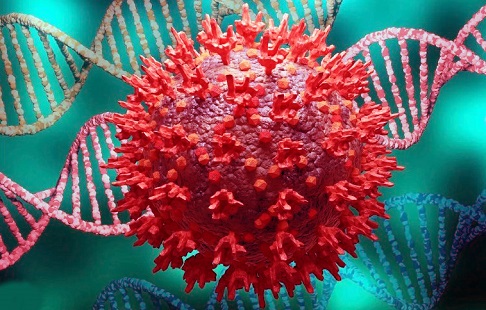Nikhil Prasad Fact checked by:Thailand Medical News Team Nov 12, 2024 5 months, 20 hours, 48 minutes ago
Medical News: Scientists from Tsinghua University, Shenzhen Bay Laboratory, Southern University of Science and Technology, and the Chinese Academy of Agricultural Sciences in China have recently uncovered a significant finding about SARS-CoV-2, the virus responsible for COVID-19. Their focus was on a specific mutation in the spike protein of the virus, called P1263L, that seems to make the virus more infectious. This
Medical News report delves into their study, exploring how this mutation affects the virus’s spread and its implications for future vaccine development.
 New Study Finds P1263L Mutation Enhances SARS-CoV-2 Infectivity
What the Spike Mutation Means for Virus Spread
New Study Finds P1263L Mutation Enhances SARS-CoV-2 Infectivity
What the Spike Mutation Means for Virus Spread
The SARS-CoV-2 virus has undergone numerous mutations since it was first identified, especially in the spike protein, a part of the virus that attaches to human cells. Researchers analyzed nearly half a million sequences of the virus and identified 40 frequently occurring mutations in the spike protein. Among these, the P1263L mutation stood out due to its potential to boost the virus’s infectivity.
Through experiments, the scientists discovered that viruses with the P1263L mutation could enter human cells at a much higher rate than viruses without it. This study explains that the P1263L mutation occurs in a region of the spike protein called the FERM binding motif, which is crucial for the virus’s interaction with human cell machinery. When the mutation disrupts this interaction, it enhances the virus’s ability to enter cells and may contribute to faster transmission.
Key Findings of the Study
Enhanced Infectivity: The study revealed that the P1263L mutation significantly increases the virus's infectivity. The researchers conducted experiments using pseudoviruses that mimic SARS-CoV-2 but do not cause disease. These pseudoviruses with the P1263L mutation demonstrated an eightfold increase in cell entry, indicating that this mutation might play a role in the rapid spread of certain variants.
-Impact on Spike Protein Integration: The P1263L mutation was also found to affect how the spike protein integrates into the virus. This integration enhances the virus's ability to infect host cells. The mutation allows the spike protein to be incorporated more efficiently into viral particles, potentially explaining the mutation’s effect on infectivity.
-Implications for Vaccine Design: The mutation's impact on the spike protein has raised the possibility of its inclusion in vaccine design. The research team used an mRNA-based vaccine in mice, incorporating the P1263L mutation to see if it could improve immune responses. Results showed that the vaccine generated higher levels of antibodies and T-cell responses, suggesting that this mutation could enhance the potency of future vaccines.
Exploring the Mutation’s Effects on Vaccines
Given the success of mRNA vaccines in the COVID-19 pandemic, the
researchers decided to test whether the P1263L mutation could improve vaccine efficacy. They developed an mRNA vaccine in the form of a virus-like particle (VLP) that included the mutated spike protein. In trials on mice, this vaccine stimulated a stronger immune response, with elevated antibody levels and improved cellular immunity.
According to the study, introducing the P1263L mutation into vaccines could be a promising strategy to develop more effective vaccines against emerging variants. By boosting the immune response, vaccines incorporating this mutation might offer better protection against both current and future SARS-CoV-2 strains.
Mechanisms Behind the Mutation’s Effects
The study explored the biological mechanisms behind the P1263L mutation’s effects. The mutation occurs in a part of the spike protein that interacts with cellular structures known as Ezrin/Radixin/Moesin (ERM) proteins. These proteins help anchor the spike protein in place, but the P1263L mutation weakens this interaction. This change allows the spike protein to become more mobile, potentially increasing its incorporation into the virus particles, thereby enhancing the virus’s infectivity.
Further laboratory experiments supported these findings. Using methods like fluorescence assays and Western blots, the scientists demonstrated that the mutated spike protein was less likely to interact with ERM proteins, which is believed to increase its mobility within the viral structure.
Future Directions for Research
The discovery of the P1263L mutation opens up new research possibilities, especially for monitoring this mutation in circulating SARS-CoV-2 variants. The researchers emphasize the importance of closely watching for this mutation in new strains to better understand its potential to impact virus spread.
Additionally, incorporating this mutation into new vaccine designs might offer improved protection against COVID-19. Since the mutation enhances both humoral (antibody) and cellular (T-cell) immunity, it could make future vaccines more effective at preventing infection and disease.
Conclusion
This new study provides a deeper understanding of the SARS-CoV-2 virus and the ways mutations can enhance its infectivity. The findings suggest that the P1263L mutation may help the virus spread more efficiently by altering the way its spike protein behaves.
The study findings were published in the peer-reviewed journal: eBioMedicine.
https://www.sciencedirect.com/science/article/pii/S2352396424004730
For the latest COVID-19 News, keep on logging to Thailand
Medical News.
Read Also:
https://www.thailandmedical.news/news/omicron-variants-with-g252v-mutation-show-greater-impact-on-t-cells-and-b-cells
https://www.thailandmedical.news/news/latest-updates-show-that-a-new-sars-cov-2-variant-called-mv-1-is-likely-to-be-the-next-contender-to-xec-variant
